Intro
Tender lymph nodes can indicate infection or illness. Learn about swollen lymph nodes, lymph node pain, and lymph node swelling causes, symptoms, and treatments to alleviate discomfort and promote healing.
The human body is a complex and fascinating system, with various parts working together to maintain overall health and well-being. One of the essential components of the immune system is the lymph nodes, which play a crucial role in protecting the body against infections and diseases. However, when lymph nodes become tender, it can be a cause for concern. In this article, we will delve into the world of tender lymph nodes, exploring their causes, symptoms, and treatment options.
Tender lymph nodes can be a sign of an underlying health issue, and it is essential to understand the possible causes of this condition. Lymph nodes are small, bean-shaped structures that are located throughout the body, with clusters found in the neck, armpits, and groin area. They contain immune cells called lymphocytes, which help to fight off infections and diseases. When the body detects the presence of foreign substances, such as bacteria or viruses, the lymph nodes become active, producing more immune cells to combat the infection. This can cause the lymph nodes to become swollen and tender, leading to discomfort and pain.
The symptoms of tender lymph nodes can vary depending on the underlying cause of the condition. In some cases, the lymph nodes may become swollen and painful, making it uncomfortable to move the affected area. Other symptoms may include fever, fatigue, and weight loss. In some cases, the tender lymph nodes may be accompanied by other symptoms, such as a sore throat, cough, or difficulty swallowing. It is essential to seek medical attention if the symptoms persist or worsen over time, as tender lymph nodes can be a sign of a more serious underlying health issue.
Causes of Tender Lymph Nodes
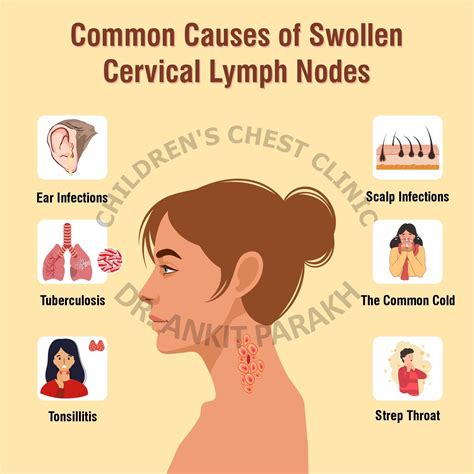
Infections and Tender Lymph Nodes
Infections are a common cause of tender lymph nodes, as the immune system works to fight off the invading bacteria or virus. Some of the most common infections that can cause tender lymph nodes include strep throat, mononucleosis, and lymphadenitis. Strep throat is a bacterial infection that can cause the lymph nodes in the neck to become swollen and tender. Mononucleosis, also known as mono, is a viral infection that can cause the lymph nodes to become swollen and painful. Lymphadenitis is an infection of the lymph nodes themselves, which can cause the nodes to become swollen, painful, and tender.Symptoms of Tender Lymph Nodes
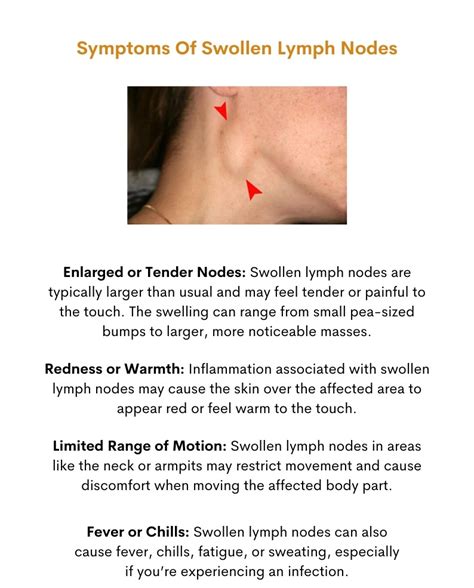
Treatment Options for Tender Lymph Nodes
The treatment options for tender lymph nodes depend on the underlying cause of the condition. In some cases, the tender lymph nodes may resolve on their own, without the need for medical treatment. However, in other cases, medical treatment may be necessary to treat the underlying condition. Some of the most common treatment options for tender lymph nodes include antibiotics, pain medication, and surgery. Antibiotics may be prescribed to treat bacterial infections, such as strep throat, while pain medication may be prescribed to relieve discomfort and pain. In some cases, surgery may be necessary to remove the affected lymph nodes or to treat underlying conditions, such as cancer.Diagnosing Tender Lymph Nodes
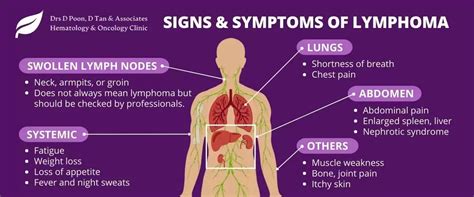
Preventing Tender Lymph Nodes
Preventing tender lymph nodes involves maintaining a healthy immune system and reducing the risk of infections. Some of the most effective ways to prevent tender lymph nodes include practicing good hygiene, getting vaccinated, and eating a healthy diet. Practicing good hygiene, such as washing hands regularly, can help to reduce the risk of infections. Getting vaccinated against certain diseases, such as flu and pneumonia, can also help to prevent tender lymph nodes. Eating a healthy diet, rich in fruits, vegetables, and whole grains, can help to support immune function and reduce the risk of infections.Tender Lymph Nodes and Cancer
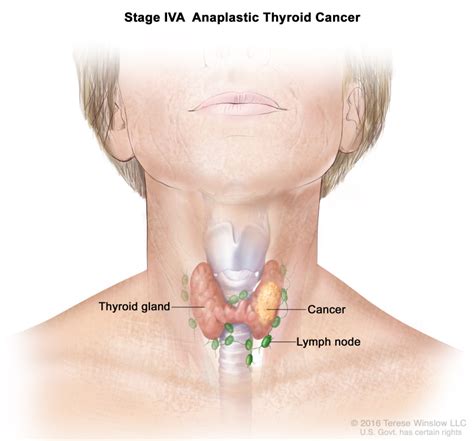
Tender Lymph Nodes in Children
Tender lymph nodes can occur in children, and the causes and symptoms are often similar to those in adults. However, children may be more prone to infections, such as strep throat and mononucleosis, which can cause tender lymph nodes. If a child is experiencing tender lymph nodes, it is essential to seek medical attention to determine the underlying cause and develop an effective treatment plan.Tender Lymph Nodes and Autoimmune Disorders
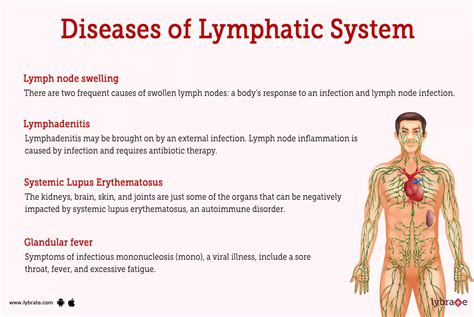
Living with Tender Lymph Nodes
Living with tender lymph nodes can be challenging, but there are several ways to manage the condition and reduce discomfort. Some of the most effective ways to manage tender lymph nodes include taking pain medication, applying heat or cold packs, and practicing relaxation techniques. Taking pain medication, such as acetaminophen or ibuprofen, can help to relieve discomfort and pain. Applying heat or cold packs to the affected area can help to reduce swelling and ease pain. Practicing relaxation techniques, such as deep breathing or meditation, can help to reduce stress and promote healing.Conclusion and Next Steps

We invite you to share your thoughts and experiences with tender lymph nodes in the comments section below. Have you or a loved one experienced tender lymph nodes? What were the causes and symptoms, and how was the condition treated? By sharing your story, you can help others understand this complex condition and promote awareness and education.
What are the most common causes of tender lymph nodes?
+The most common causes of tender lymph nodes include infections, autoimmune disorders, and cancer. Infections such as strep throat, mononucleosis, and lymphadenitis can cause the lymph nodes to become swollen and tender. Autoimmune disorders, such as rheumatoid arthritis and lupus, can also cause tender lymph nodes, as the immune system mistakenly attacks healthy tissues. In some cases, cancer, such as lymphoma or leukemia, can cause the lymph nodes to become tender and swollen.
How are tender lymph nodes diagnosed?
+Diagnosing tender lymph nodes typically involves a physical examination, medical history, and diagnostic tests. The doctor will perform a physical examination to check for swollen and tender lymph nodes, as well as other symptoms, such as fever and fatigue. The doctor will also ask questions about the patient's medical history, including any previous illnesses or infections. Diagnostic tests, such as blood tests and imaging tests, may be ordered to determine the underlying cause of the tender lymph nodes.
Can tender lymph nodes be prevented?
+Preventing tender lymph nodes involves maintaining a healthy immune system and reducing the risk of infections. Some of the most effective ways to prevent tender lymph nodes include practicing good hygiene, getting vaccinated, and eating a healthy diet. Practicing good hygiene, such as washing hands regularly, can help to reduce the risk of infections. Getting vaccinated against certain diseases, such as flu and pneumonia, can also help to prevent tender lymph nodes. Eating a healthy diet, rich in fruits, vegetables, and whole grains, can help to support immune function and reduce the risk of infections.
